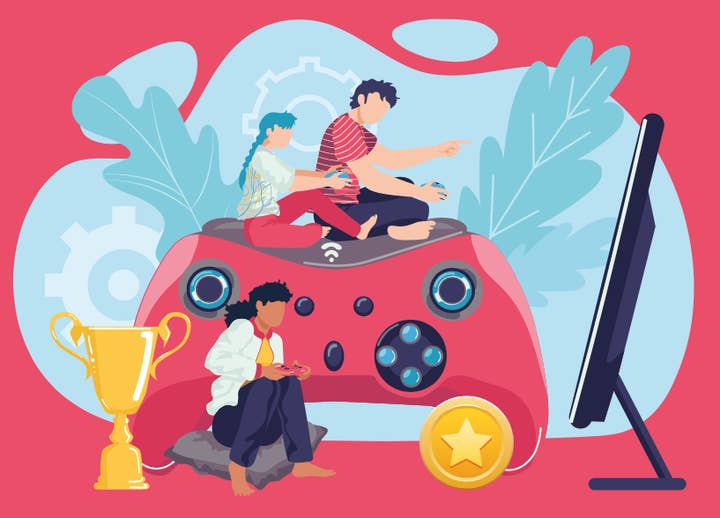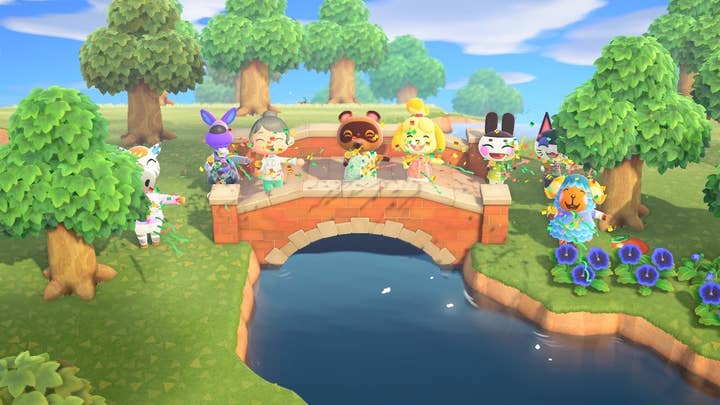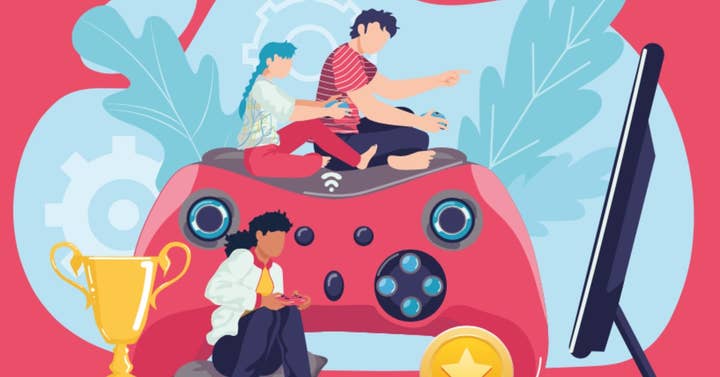SELL: French industry's record year not just about COVID
SELL president Julie Chalmette looks back at a year of impressive growth for the French games market
It's no revelation at this point that people played video games in 2020. And in France, that helped the games market generate an all time high of €5.3 billion.
As reported by French games industry body SELL in its annual report yesterday, there were 27.5 million physical and digital games sold in the country in 2020, alongside 2.3 million consoles and seven million accessories.
In five years the French market has grown by 40%, from turnover of €3.6 billion in 2016. But SELL president Julie Chalmette -- a GI 100 alumnus -- believes that this growth is not all down to COVID-19.
"I think we were just in a specific year -- a year where we would be releasing two new consoles, [which is] one of the main reasons why we were expecting such growth, especially on the hardware side. And we were also expecting quite a lot of big new releases in terms of software. [In 2019], we had this slight decrease on the market compared to 2018, but we had anticipated that 2020 would mark a comeback to growth."

In 2019, games generated €4.7 billion in France, a 3.5% decline compared to the year before. At the time, consoles fared particularly poorly, with hardware sales decreasing 21% year-on-year -- a decline that's to be expected at the end of a generation.
But 2020 was definitely the year of console gaming in France, with the segment growing 10% across hardware, software and accessories, representing 51% of the games market as well as a value of €2.7 billion. But there's no denying that the COVID-19 effect was well and truly present.
"There is no doubt that COVID and lockdown -- especially the first lockdown -- had a tremendous impact on several aspects of video gaming," Chalmette admits "First of all people have played more than they used to. [Across] console, PC, and mobile, the average number of hours played every week increased quite dramatically between the fourth quarter of 2019 and the very first quarter of 2020, which marks the very beginning of the lockdown. So the numbers soared from eight hours and 30 minutes to nine hours and 30 minutes.
"The average spend has increased too, from €110 last year to €123 this year. So not only have people played a bit more, but also they have spent a bit more on video games. What we've also seen is that the number of full games downloaded has increased quite dramatically from one year to another. So last year we sold 27.5 million units of full games, which is an increase of 16.6% -- out of that, 12 million were digital, which was an increase of 65.5% compared to [2019]."
On the other hand, physical games sales decreased 3.2% in France last year. This decline is not dramatic by any means, and it initially doesn't come as too much of a surprise considering the troubled time that 2020 represented for retail.
But a quick look at other markets shows that it is somewhat unusual. Physical software sales grew 2% in the UK in 2020, and a whopping 15% in Australia. It's all the more surprising considering the popularity of Nintendo in France, a very physical-friendly publisher.
"Not only have people played a bit more, but also they have spent a bit more on video games"
But Chalmette is keen to emphasize that this decline of physical sales was to be expected considering both the circumstances and the natural trend of the industry towards digital.
"I would have expected a much more dramatic decrease given the circumstances on the French market -- many stores were closed for a high number of weeks," she says. "I think it is quite obvious that the trend of the market is going towards digital. [It] is growing from one year to another and there is no doubt that it's a long long-term trend.
"We saw a decrease of physical sales the year before [too] and we've seen that for quite many years. So we would have expected 2020 to be even worse in terms of physical sales. But it's not what happened."
What happened, Chalmette explains, is that specialist stores were particularly impacted by the situation, whereas hypermarkets remained opened and were allowed to sell games. That didn't only impact the amount of physical games being sold, but also the type of titles.
"Some games, which did particularly well, were more represented at hypermarkets than they [were] at specialist [stores]. They don't need the specialist stores as much as other IP would. I'm thinking specifically [about] Nintendo. One of the reasons why the physical market has resisted pretty okay is due to this shift between the different channels. So the specialist stores have declined whereas the [hypermarkets], e-commerce and web shops have increased.
"Secondly -- and maybe that's only pure optimism on my side -- we've seen [players have] a certain level of loyalty towards their retail stores. And we've seen that [as well] on the food market and [bookstores] for instance. Some customers have decided to stay loyal to them and deliberately chosen not to buy elsewhere."

The closure of bookshops during lockdown caused an uproar in France, as many considered them a necessity. They were ultimately added to the essential shops list in February 2021, meaning they can now remain open. So it's not a stretch to imagine the loyalty Chalmette is describing when it comes to game stores.
The SELL president wouldn't comment on how much of the market is driven by French studios, as the organisation can't comment on figures from its individual members. However, she briefly comments on the situation as managing director of ZeniMax in France.
"I think Ubisoft titles tend to do well in France. It's very logical, and what I can say from my personal experience from being the general manager of Bethesda is we saw [that] in Arkane games as well, which are developed in France.
"Usually we can observe that there is a bigger appetite for French developed games, especially when you can play the card of it being a French game. With French studios, there's just easier access to the developers not only for PR but also community-driven events and so on. But having said that, what prevails over anything else in France is Nintendo's incredible market share."
"What prevails over anything else in France is Nintendo's incredible market share"
France has historically been a very Nintendo-driven market. Out of the top 20 physical games of 2020 in France, 11 were published by Nintendo -- and together those titles sold almost 3.7 million copies. Animal Crossing: New Horizons was the best selling physical game in the country, with almost 1.1 million units, and it feels fair to say it would have probably topped the physical and digital combined charts if Nintendo shared its digital figures.
Mario Kart 8 Deluxe, which released four years ago, made it to No.3 in the physical charts in France in 2020, selling 553,803 units -- more than the combined physical sales of FIFA 20 (187,229), Ghost of Tsushima (167,531) and GTA V (188,738).
"This dates back from many years, so it's not only with the Switch, it was true also with the DS," Chalmette says about Nintendo's domination. "Somehow I would say that I think there is more maturity in the [English-speaking] markets for gamers. I think that Nintendo with the DS brought many new gamers [to the market], and people stuck with that.
"Something about the French market as well is that my generation -- I'm almost 50 -- was raised with Japanese manga and anime. France is the second biggest market for manga in the world. So there is this appetite for everything that relates to Japan in France, and maybe part of the explanation lies here. But other than that, I feel that the French market is still more of a mass market -- [with] mass market gamers as opposed to like super hardcore [gamers]. So you probably have a higher proportion of hardcore gamers in the UK than we have in France."

The demographics of French players has evolved in recent years. SELL's report highlights that out of the 52% of the population that plays regularly, 53% are men versus 47% women, with an average age of 39 for both genders. As a comparison, the average age of a player in the EU is 31, the IFSE reported -- though it doesn't specify whether these are regular players or not.
"20 years ago, the average age of the players was 20 years old, and they were mostly [men]," Chalmette points out. "And in recent years obviously we had Nintendo but we also had mobile -- mobile gaming is really increasing super strongly in France and everywhere else in the world. So this is bringing a new profile of players into gaming.
"My mother for instance, she doesn't know she's a gamer, but she is a gamer. She spends quite a lot of time on her games, even though she doesn't identify as a gamer. On top of that, the players who were 20 years old 20 years ago, they're 40 years old today, so there's some logic to that. So not only is the population of gamers aging but also there is a new population of people who are playing."
Concluding our chat, we ask Chalmette what she anticipates happening in the French market once we're beyond the pandemic.
"That's the hardest question! I have no idea," she laughs. "We're in a super strong position. The video game industry is really strong in France and everywhere else in the world. We're entering this new generation of console hardware, there are super interesting trends that are developing, such as cloud gaming and subscriptions. [Cloud gaming] is making gaming more and more accessible, and technology less and less visible, which I think is incredibly exciting. Mobile gaming is bringing a new population of gamers into the gaming industry.
"I don't think we could be in a better place, and on top of that, I think there is this recognition that games might not be as bad as some people, some media or some organisations like [World Health Organization] were saying a couple of months ago. There is more and more this recognition that gaming can be good. 2020 has proved that it's helped people stay mentally healthy and stay connected with their friends. It helped people just to entertain themselves in a period [that] was extremely [distressing].
"I don't think we could be in a better position, and I think the years ahead are gonna be so extremely exciting. I've been into this industry for over 20 years and sometimes you think you can sit down on your chair and enjoy success, or you might believe that you have the recipe for success, but all of a sudden everything is changing again. Paradigms change and evolve, and I think it's going to be super exciting [not only] in the French market but everywhere else."

